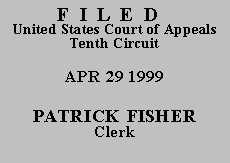 UNITED STATES COURT
OF APPEALS
UNITED STATES COURT
OF APPEALS
 UNITED STATES COURT
OF APPEALS
UNITED STATES COURT
OF APPEALS
| SAMUEL J. WILDER,
Judge, |
No. 98-5242
(D.C. No. 98-C-822-C) |
The district court granted Wilder IFP status, and permitted his complaint to be docketed without payment of fees. However, raising sua sponte the affirmative defense of absolute immunity on behalf of the judges who had yet to be served with Wilder's complaint,(1) the district court dismissed the complaint as frivolous under 28 U.S.C. § 1915(e)(2)(B)(i).
Wilder now appeals the dismissal of his complaint, moves this court for leave to proceed on appeal without prepayment of costs or fees, and prays for a writ of mandamus commanding Tulsa County Sheriff (not formerly named in Wilder's suit) "to produce a list of Petitioner's personal items, and records . . . seized by County Sheriff's D[e]puties, and Tulsa Housing Authority agents, on October 21, 1998."
"We review frivolousness determinations under section 1915[(e) (formerly subsection (d))] for an abuse of discretion." See Fratus, 49 F.3d at 674. On appeal, Wilder has failed to assert any perceptible basis on which we could question the district court order. Based on our review of appellant's brief and the record, we conclude that the district court did not abuse its discretion in dismissing Wilder's complaint as frivolous. Accordingly, we affirm the dismissal and deny Wilder's motion for leave to proceed on appeal without prepayment of costs or fees.
Further, we deny Wilder's petition for mandamus. Mandamus is an extraordinary remedy, which will issue only in exceptional circumstances. See United States v. Roberts, 88 F.3d 872, 882 (10th Cir.1996). A petitioner for a writ of mandamus bears the burden of showing that his or her right to the writ is "clear and indisputable." Id. Wilder has failed to make any such showing.
The mandate shall issue forthwith.
ENTERED FOR THE COURT
David M. Ebel
Circuit Judge
*.After examining appellant's brief and the appellate record, this panel has determined unanimously that oral argument would not materially assist the determination of this appeal. See Fed. R. App. P. 34(a)(2) and 10th Cir. R. 34.1(G). The case is therefore ordered submitted without oral argument. This Order and Judgment is not binding precedent, except under the doctrines of law of the case, res judicata, and collateral estoppel. The court generally disfavors the citation of orders and judgments; nevertheless, an order and judgment may be cited under the terms and conditions of 10th Cir. R. 36.3.
1.While the district court recognized that "the raising of an affirmative defense sua sponte, and the subsequent dismissal of the action on that basis, is generally disfavored in most cases," it cited our decision in Fratus v. Deland, 49 F.3d 673, 674-75 (10th Cir. 1995), for the proposition that "such a course of action is nevertheless proper if the affirmative defense is obvious from the face of the complaint." (Dist. Ct. Op. at 2.) Cognizant of its duty to construe Wilder's pro se complaint liberally, the district court found it "obvious from the face of the complaint" that the affirmative defense of absolute immunity would bar Wilder's suit against federal and state judges who Wilder was suing "based solely and entirely [because of] defendants' performance of their respective duties in the course of judicial proceedings." (Id. at 3 & n.2 (citing United States v. McKinley, 53 F.3d 1170, 1172 (10th Cir. 1995).)